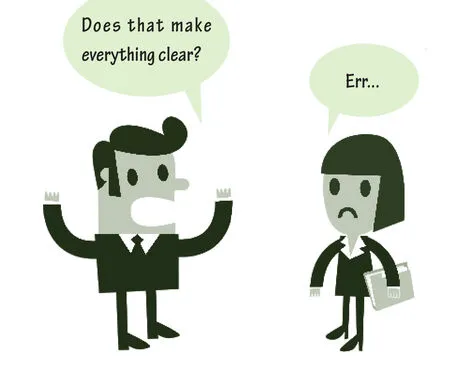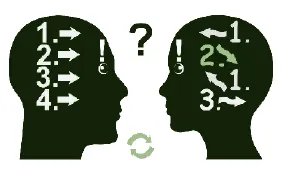HAvoowid to Misunderstandings如何避免误会
2018-01-24ByFeifeiNeil
⊙ By Feifei & Neil
在与他人交谈的时候,如果我们听不清楚对方的话、不确定对方的意思,甚至误解对方的意思,都可能造成不必要的误会。这种事情一旦发生,轻则闹个笑话,重则耽误大事。其实很多时候,我们在交谈时就已经产生了疑问,为了避免不良后果,就要把可能的误会消除在萌芽状态。下面的对话教你用多种方式应对可能产生误会的情况。一起来听听吧。

Feifei: How are you, Neil, and what are we talking about today?
Neil: I’m very well, and today we’re talking about misunderstandings. A famous French writer once said that “Language is the source of misunderstandings.” With me in the studio today are colleagues Conrado and Stephani, who have come in to tell us about a misunderstanding they had recently. Conrado and Stephani, welcome.
Stephani: Thank you.
Conrado: Thank you.
Neil: So, tell us about your story.
Conrado: Well, we work in the same company, but in different offices. And one day I was speaking to Stephani on the phone, and I asked her a question, and she didn’t know the answer, so she said “hang on.”
Stephani: “Hang on” means “wait.” I wanted him to wait while I found the answer.
Conrado: But I got confused, I thought “hang on” was the same as “hang up,” and “hang up”means “put the phone down, finish the phone call.”
Stephani: So when I came back with the answer, he was gone! So I called him back and told him the answer, then he asked another question, so I said “hang on” again, and again he was gone! Three times I had to call him back!
Conrado: I didn’t understand why she was getting angry with me. She got really angry actually,before we sorted it out[解决].
Neil: Hang up, hang on… That’s a really good one!
Feifei: If only you’d had Business Betty there to help…
Neil: Ah, Business Betty. Ooh, here she is now.
N&F: It’s Business Betty!
BB: Hello!
Neil: Hello, Betty, and may I say you’re looking absolutely fantastic as ever.
BB: Thank you, Neil, and how can I help you?
Neil: We need some tips on avoiding[避免]misunderstandings.
BB: Certainly. If language is the source of misunderstandings, the best way to avoid misunderstandings at work is to check what people mean when they’re talking to you. There are several ways to do this. You can simply say What do you mean by that?
Neil: What do you mean by that?
BB: That’s right. Or you can tell the person what you think they mean, in your own words. Say Do you mean…?
Neil: Do you mean…?
BB: Or So, are you saying…?
Neil: So, are you saying…?
BB: Or Correct me if I’m wrong, but do you mean…?
Neil: Correct me if I’m wrong, but do you mean…?
BB: Good, Neil. You can say Sorry, I’m not sure if I got that. Are you saying…?
Neil: Sorry, I’m not sure if I got that. Are you saying…?
BB: Or you can ask the other person to explain what they mean. Say something like Sorry,what exactly do you mean by that?
Neil: Sorry, what exactly do you mean by that?
BB: Or say Sorry, could you go over that again?
Neil: Sorry, could you go over that again?
BB: Could you expand on that?
Neil: Could you expand on that?
BB: And finally, another way to avoid misunderstandings is to check that the person you’re talking to has understood you. Just ask them! Say something like Is that clear?
Feifei: Is that clear?
BB: Or, after an explanation, say Does that make everything clear?

Feifei: Does that make everything clear?
BB: And never forget the golden rule of avoiding misunderstandings—if in doubt,ask! It’s better to ask now than make a mistake later.
Neil: Thanks, Betty.
BB: You’re welcome. Bye!
N&F: Bye!
Neil: She’s so good… Don’t you think so,Conrado and Stephani? Don’t you think she’s brilliant—Business Betty?
C & S: Oh yes! Exactly!
Feifei: Well, that’s very good because we’re about to put it to the test!
Neil: Yes, Conrado and Stephani. Let’s imagine you’re back there now in your offices. You’re having this conversation that got you into so much trouble. But this time, use some of Betty’s tips, see if you can get it right.
Feifei: Does that make sense? Have another go at the hang on/hang up conversation, but this time do what Betty suggested. OK? Are you ready?
C & S: Yes, we are ready.(Role-play)
Conrado: Ring ring!
Stephani: Hello, Stephani speaking.
Conrado: Hello Stephani, it’s Conrado. I just wanted to ask if the reports are ready.
Stephani: The reports…Do you mean the monthly reports or the yearly reports?
Conrado: Oh sorry, yes, the monthly reports.
Stephani: The monthly reports. OK, just hang on.
Conrado: Sorry, I’m not sure if I got that. Are you saying “Wait a minute”?
Stephani: Yes, just hang on a couple of minutes, please.
Conrado: OK.
Stephani: (A couple of minutes later) Hello Conrado, sorry to keep you waiting. The monthly reports are nearly ready—the accountant[会计]is finishing them this afternoon.
Conrado: Correct me if I’m wrong, but do you mean they’ll be ready by the end of today?
Stephani: Yes, they’ll be ready by 5 o’clock today. Does that make everything clear?
Conrado: Oh yes, thanks, that’s great. Thank you very much!
Stephani: You’re welcome.
Feifei: And that’s the end of today’s role-play!
Neil: How was it for you two?



Conrado: It was great, much much better.
Stephani: Yeah, I wish we’d done it that way in the first place.
Neil: That’s good and that’s it.
Feifei: Are you saying that we’ve reached the end of today’s programme?
Neil: Yes, we have, so thanks for helping us out today, Conrado and Stephani. It’s goodbye from all of us.
All: Bye!
见招拆招
避免误会的常用句型
● 确认对方的意思
◇ What do you mean by that?
◇ Do you mean...?
◇ So are you saying...?
◇ Correct me if I’m wrong, but do you mean...?
◇ Sorry, I’m not sure if I got that. Are you saying...?● 请对方解释
◇ Sorry, what exactly do you mean by that?
◇ Sorry, could you go over that again?
◇ Could you expand on that?● 确定对方明白你的意思
◇ Is that clear?
◇ Does that make everything clear?

词汇学习
● She got really angry actually, before we sorted it out.
词组sort out作“分类”解是同学们在课本上学过的用法。Sort out其实是一个有多层含义的词组,除“分类”外的另外一个常见用法就是该句里的用法,作“弄清楚,解决”解,既可指弄明白尚未明了的问题,也可指解决存在的问题,如:
◇ We need to sort out the present situation before making any decisions.(我们在做决定之前先要弄
清当前形势。)
◇ I need to get my own problems sorted out.(我需要把自己的问题解决好。)
● Have another go at the hang on/hang up conversation, but this time do what Betty suggested.
与许多常见动词一样,go也可以作名词用。而“尝试”正是它作名词时的其中一个义项。与attempt或try等其他同样表达“尝试”的名词不同,它比较随意,一般不在正式场合使用,如:I’ve never tried karate before,but I’m willing to have a go.(我从来没试过空手道,但我愿意尝试一下。)
